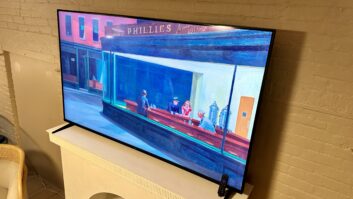Earlier this year TWICE ran a column authored by Consumer Electronics Association (CEA) president/CEO Gary Shapiro. In it he talked about the ongoing battle CEA is waging to protect consumers’ right to record audio and video material. And my immediate reaction was, “Gary is beating the same old horse again.” After all, this was a major theme at CEA’s fall meeting in San Francisco, at International CES in January and again at the spring meeting in Washington. So how much is enough?
But later I started thinking about the issue itself which, it seems, is really never ending and has actually escalated since the dawn of digital. The right to record has been under vigorous attack by copyright owners since the appearance of the cassette, and the pace of the assault picked up with the introduction of digital recorders that make copying simpler, faster and more faithful to the original than ever.
This is an attack that is really waged primarily in the halls of Congress by copyright owners and publishers seeking legislatively imposed restrictions, both legal and technological, on the right of individuals to record. Clearly a defense against this is necessary, and the question is — if CEA isn’t going to lead it, then who will?
There was a time in industry history when if a new product or major industry issue arose that concerned manufacturers and marketers, they stepped forward themselves to take the lead, sometimes individually or in partnership with each other or the industry association.
Zenith stood all but alone in spending millions to fight what it saw as unfair competitive practices by importers of TVs from the Far East, and Sony was of course in the forefront of the famous Betamax case that saw the Supreme Court uphold the rights of manufacturers to market, and consumers to buy and use, recording devices.
But those days are long gone, along with Zenith and other U.S. corporations that provided the executives and financing. Today, to the best of my knowledge, LG, Panasonic and Samsung are the ones with full-time offices in Washington, though I assume others have paid lobbyists representing their interests. Speaking realistically, I doubt that a spokesman for a foreign company, even one with a significant U.S. workforce, has as much clout in D.C. as one representing a domestically owned one.
As for pushing new product concepts, now we have mini associations that can’t get their acts together. The Blu-ray and HD DVD camps, the plasma and LCD TV consortiums and the HD-Radio group have all come up with underwhelming consumer educational efforts. And as for informing consumers about the end to analog TV, it’s been almost a half year since the NCTA, broadcasters and CEA promised to develop a massive campaign. Now with less than two years left before the changeover to digital, they are still promising, and I expect CEA will end up having to do the job alone.
Fortunately CEA is an organization representing hundreds of manufacturers, marketers and retailers representing tens of thousands of American jobs, and can effectively speak for both them and the consumer interests they protect. Which is great, because as our industry continues to evolve, that job is only going to get tougher and the need for strong representation to keep the technological clock ticking gets greater.













